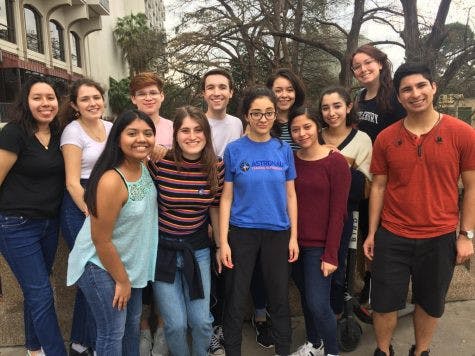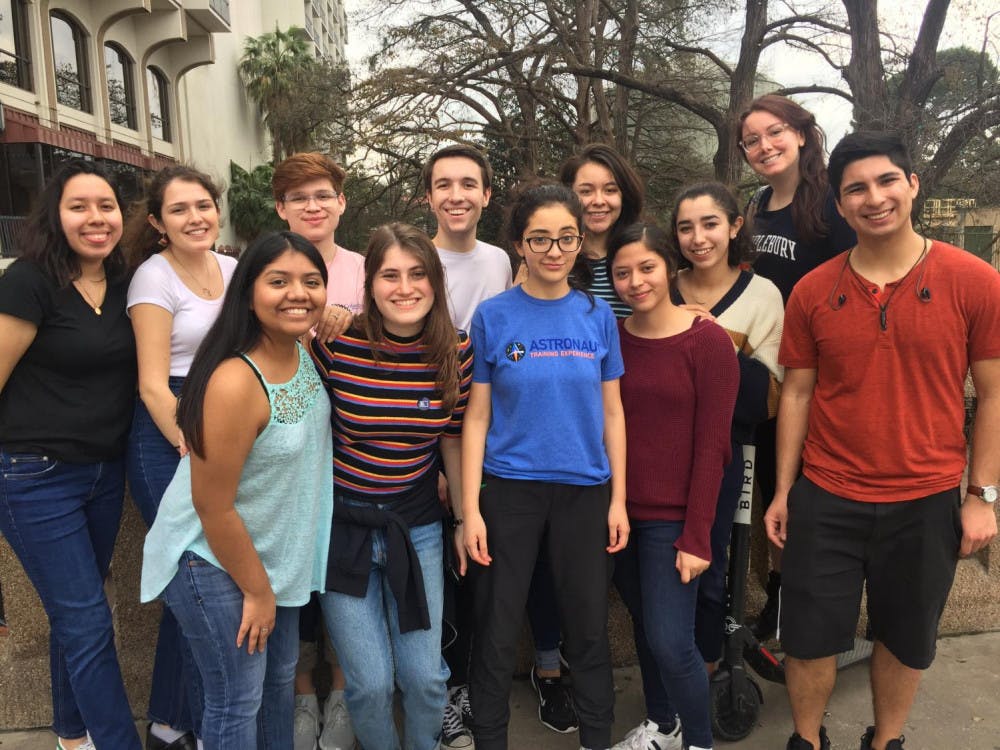“That’s going to be you in a couple years,” an asylum-seeking immigrant mother said to her daughter, pointing to Middlebury student Alondra Carmona ’21.
Carmona was providing legal service to the mother and her daughter on a Middlebury Alternative Break trip (MAlt trip). The mother and daughter were at a bus station heading to Carmona’s hometown of Chicago after being held in a family detention center near San Antonio. For Carmona, an immigrant who came with her parents to the U.S. at age three from Mexico, the parallels were uncanny.

Middlebury students experience first hand what President Trump has deamed a National Emergency, providing guidance to immigrants who have recently crossed the Southern boarder.
Carmona and Hannah Krutiansky ’19 led a group of 10 other Middlebury students on a MAlt trip over February break focused on immigration advocacy in San Antonio. The group worked with a nonprofit agency, Refugee and Immigrant Center for Education and Legal Services (RAICES), that provides free and low-cost legal services to underserved immigrant children, families and refugees.
“This is the frontlines of the immigration fight,” Krutiansky said. “This is the trenches. These are people recently arriving at the border, seeking asylum, suffering through our messed-up, convoluted immigration system. And we are jumping in and working with them directly and trying to make sense of this.”
Krutiansky and Carmona directed their efforts towards separate phases of the asylum-seeking process. Krutiansky, who has worked for RAICES for the past two summers, helped asylum seekers prepare for their “Credible Fear Interview” at Karnes Detention Center near San Antonio. For these asylum seekers, this interview is the difference between deportation and a chance at a new life. Asylum seekers must demonstrate that if they are deported, they will face discrimination or persecution based on race, religion, nationality, political opinion or a membership in a particular social group.
[pullquote speaker="Hannah Krutiansky '19" photo="" align="center" background="on" border="all" shadow="on"]These are people recently arriving at the border, seeking asylum, suffering through our messed-up, convoluted immigration system. And we are jumping in and working with them directly and trying to make sense of this.[/pullquote]
Spanish proficiency was a requirement for the trip participants, who helped make each person’s story as compelling as possible to the asylum officer who would be deciding their case.
“It’s really challenging because a lot of them might be illiterate or [only speak an] indigenous [language], or they might be really traumatized,” Krutiansky said. “We help to get their story down linearly and hit important points like why the police couldn’t protect them, why they couldn’t relocate in their country. We orient them because most of them might have claims but most of them don’t know how to phrase their story that will fit into the box.”
Meanwhile, Carmona and three other trip participants gave legal orientations at the bus station that will transport asylum-seekers and immigrants to their sponsor or final destination.
[pullquote speaker="Alondra Carmona '21" photo="" align="center" background="on" border="all" shadow="on"]The detention center is basically a jail for them.[/pullquote]
“It was basically post-release services: (explaining) your rights, helping interpret and translate their papers,” Carmona said. “It’s a new setting. The detention center is basically a jail for them. So when they’re released, one of the things that they told us is it’s the first time they are meeting a friendly face. You’re the first person that’s telling them, ‘Welcome to the United States.’”
Immigrants and asylum have to parse through “packages” — thick stacks of papers filled with legalistic jargon that contains important information and dates. The MAlt participants translated this information and explained that the two sets of dates that asylum seekers needed to keep track of: court dates that were necessary to obtain asylum and check-ins with Immigration Customs Enforcement (ICE). Missing either one of these appointments could result in a deportation notice.
The asylum-seeking process is complex and differs slightly depending on an immigrant’s status as an unaccompanied minor, an adult, or a family. Immigrants are either apprehended at the border or express fear of returning to their home country at a port of entry. They are held in pre-detention processing facilities, likened to an ice box (“la hielera”) by detainees due to its freezing temperatures and a dog pound (“la perrera”) for its chain link fences.
Immigrant families are then sent to family detention centers, where they must pass the Credible Fear Interview. There are three family detention centers in the United States. Karnes, where the MAlt participants worked, and Dilley are located in Texas, while Berks family detention center is in Pennsylvania. The centers are operated by for-profit private prison companies like CoreCivic and GEO group.

Alondra Carmona (left) and Hannah Krutiansky led students on a MAlt trip to San Antonio over Feb break, where they worked with the immigrantion advocacy group RAICES.
Those who pass are transferred to the bus station. After this process, the immigrants still have no legal status and are required to continue to the asylum process outside of detention.
Krutiansky and Carmona were vividly aware of the high stakes of their work. Most asylum seekers are fleeing some form of gang violence, Krutiansky said, particularly from the region known as the “Northern triangle” of Central America: El Salvador, Honduras, and Guatemala. Many immigrants faced the threat of extortion and murder if they returned to their home countries. Other immigrants were political activists or victims of domestic abuse. Some immigrants were indigenous people escaping crippling poverty resulting from discrimination. However, economic migrants are not qualified for refugee status under asylum law.
“The policies are so absurd,” Carmona said. “The fact that (a participant) had to interview someone and she knew that he was in danger of basically dying if he went back to his home country. And yet that was exactly what was going to happen.”
The news cycle has been dominated by issues of immigration in the past year, in large part due to President Trump’s “zero tolerance” policy, enacted in April 2018, to prosecute every illegal entry case into the United States. Soon after, media outlets reported over 2,300 cases of family separation when parents were criminally prosecuted while children were treated as “unaccompanied alien children” and handled by the Office of Refugee Resettlement. Trump then issued an executive order on June 20 stating that “it is also the policy of this Administration to maintain family unity” thereby ending the practice of family separation.
[pullquote speaker="Alondra Carmona '21" photo="" align="center" background="on" border="all" shadow="on"]The people and their stories make it impossible to ignore the struggles they go through.[/pullquote]
With all the media noise, the MAlt experience pushed participants to confront the realities of the immigration debate.
“We’ve all heard about the horrible situation that immigrants go through,” Carmona said. “We have the luxury of ignoring these stories. When you talk to these people, you’re making connections and they could be your parents and your aunts and uncles. The people and their stories make it impossible to ignore the struggles they go through.”
With grueling days that started at 9 a.m. and lasted until as late as 8 p.m., Krutiansky said that many participants are still processing what they saw. Many expressed outrage at the current immigration system, and hope to return as volunteers to RAICES.
“It really fuels you,” Krutiansky said. “Middlebury students are smart and they are going to be in important positions one day. For them to have seen this experience and take it with them, the choices they’re going to make and the influence they’re going to have — I think that’s the biggest takeaway.”
MAlt Trip Brings Students to Southern Border to Assist Asylum Seekers

COURTESY PHOTO
COURTESY PHOTO
Comments



